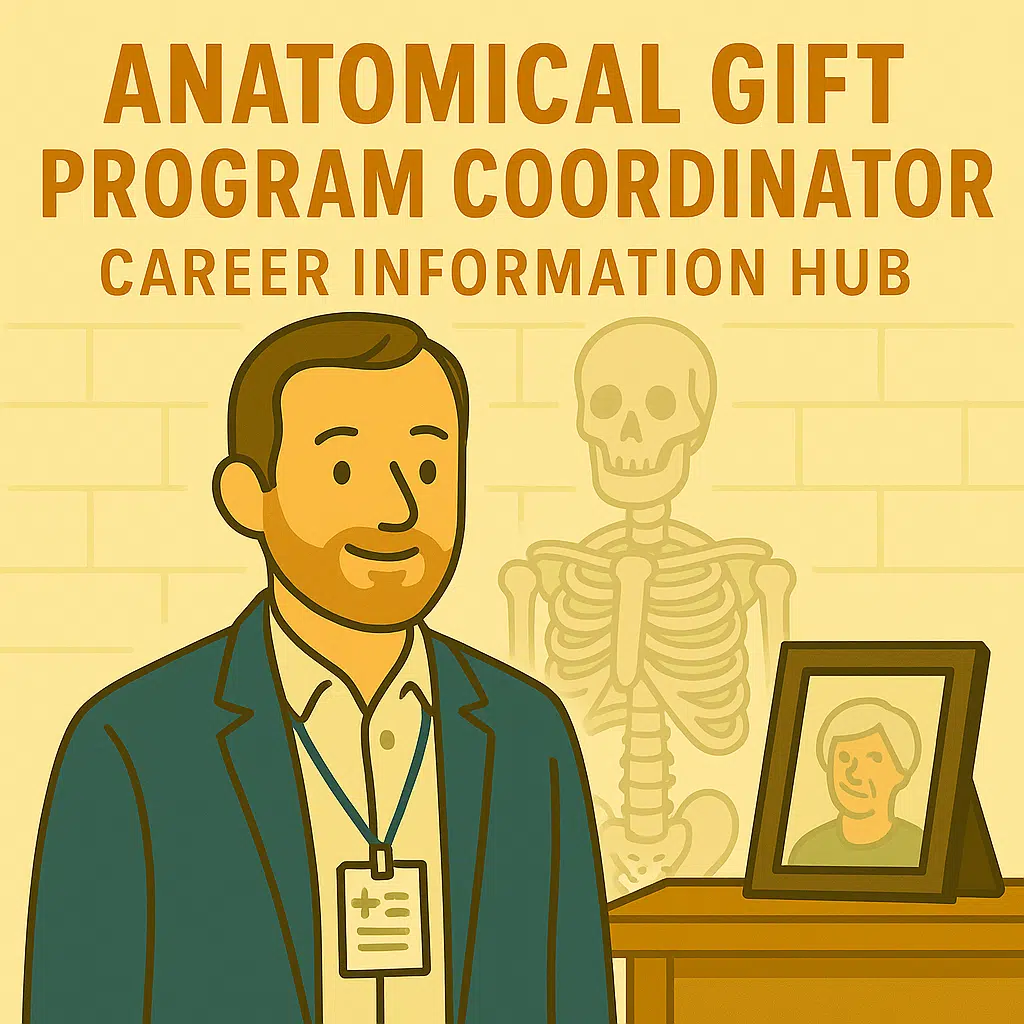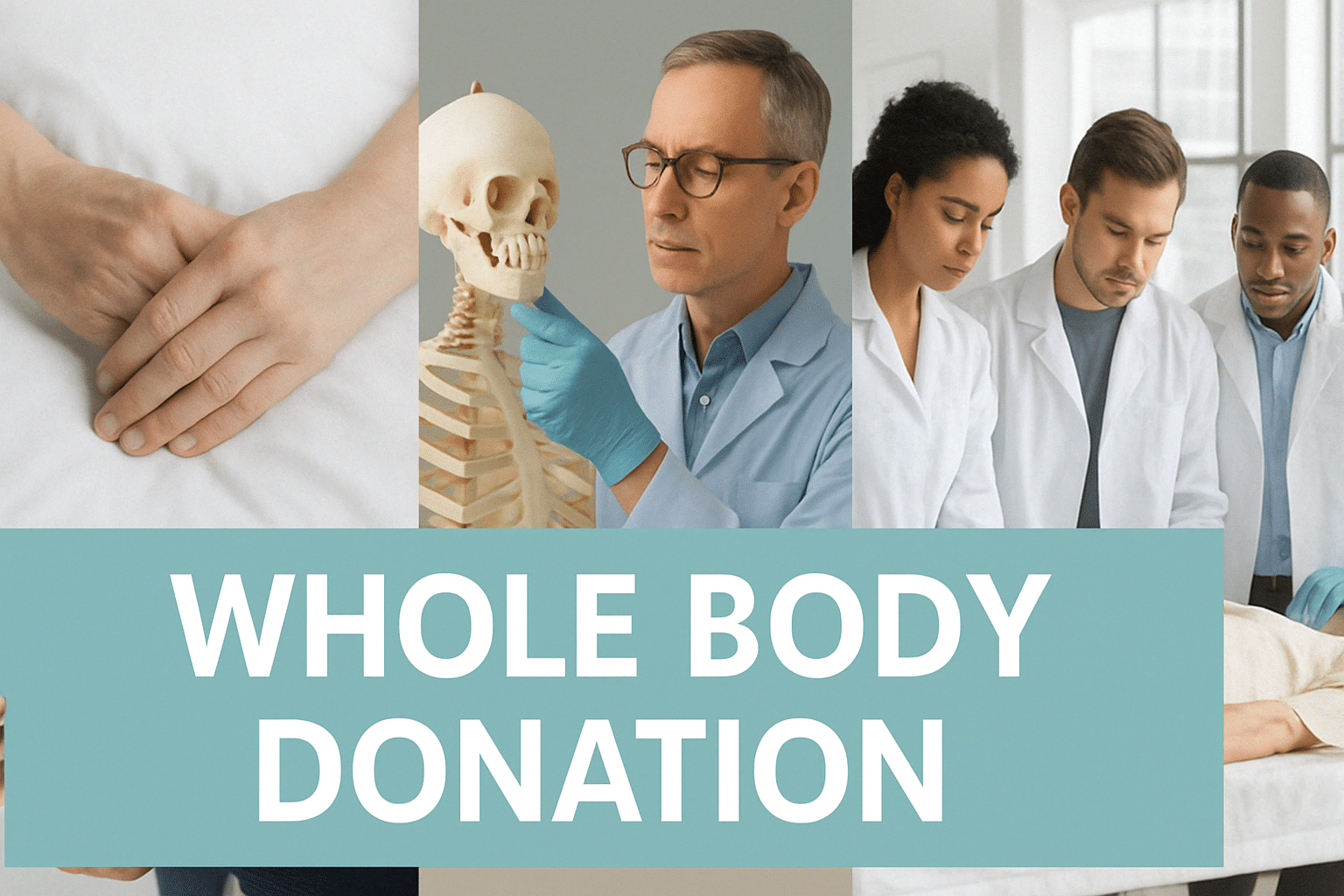Because not all teachers are alive
The Anatomical Gift Program Coordinator Career Information Hub
Every year, thousands of people make the remarkable choice to donate their bodies to science. It’s a gift that trains doctors, teaches anatomy, advances research, and shapes healthcare for the next generation. But none of it happens without someone coordinating the details. That’s where Anatomical Gift Program Coordinators come in.
They’re the stewards of this process, from intake and transportation to compliance and communication with families. It’s quiet work, but deeply meaningful. If you’re someone who’s organized, calm under pressure, and cares deeply about both science and people, this is a career worth exploring.

Key Things To Know
This role balances logistics, law, and compassion. Here's what sets it apart:
-
You’re not in a hospital: Most coordinators work within a university or medical school setting, not clinical care.
-
You’re working with the deceased: This is not organ donation. It involves full-body donation for education or research.
-
You support future doctors: Every donor becomes a vital part of medical training for students who need hands-on learning.
-
You’ll interact with grieving families: Clear, compassionate communication is a core part of the role.
-
You manage detailed logistics: From paperwork and consent forms to transportation and records, accuracy matters.
-
You must know the law: Familiarity with the Uniform Anatomical Gift Act, HIPAA, and OSHA standards is required.
-
Every day looks a little different: Some days are spent on transport coordination, others on memorial planning or policy updates.
Why Choose This Career?
There are plenty of jobs that help people. This one helps people help others, long after they’re gone.
-
You bring donor wishes to life: When someone wants to donate their body, you make sure their final wish is fulfilled.
-
You support families during difficult moments: Your calm, professional guidance can offer a surprising sense of peace.
-
You support better healthcare: By ensuring students get hands-on training, you directly support the future of medicine.
-
You bring dignity to the process: It’s not just about paperwork. It’s about honoring a gift.
-
You’ll gain rare knowledge: Most people never learn the logistics behind anatomical donation. You’ll become an expert in a specialized field.
-
You coordinate across many teams: From funeral homes to anatomy labs, you help everyone work together smoothly.
-
You can take pride in quiet service: You may not be in the spotlight, but your work truly matters.
Job Responsibilities
This is a role where organization, consistency, and humanity all matter. Expect to handle tasks like these:
-
Register and manage donors: Track consent forms, confirm eligibility, and maintain secure records.
-
Coordinate transportation of remains: Arrange timely and respectful transfers from homes, hospitals, or care facilities.
-
Ensure legal and ethical compliance: Follow institutional guidelines and government regulations at every step.
-
Support communication with families: Provide updates, answer questions, and guide them through the process with clarity and care.
-
Collaborate with anatomy departments: Make sure educators have what they need, and that cadavers are used appropriately.
-
Oversee inventory and preparation: Help prepare bodies for educational use and manage the cycle from arrival to final disposition.
-
Plan donor remembrance events: Many programs host annual memorials to honor donors. You may organize or assist with these services.
Education and Certification Requirements
You don’t need a specific license, but the role requires a unique blend of knowledge and interpersonal skills.
-
Bachelor’s degree is often preferred: Fields like health sciences, public health, social work, or nonprofit administration are common.
-
Experience in funeral or deathcare helps: Many people enter from funeral homes, hospice, or medical admin backgrounds.
-
Familiarity with donation law is essential: You’ll need to understand HIPAA, OSHA, and the Uniform Anatomical Gift Act.
-
Strong communication skills are a must: You’ll be working with families, educators, and sometimes students.
-
Ethics training is valuable: Respect, privacy, and dignity are central to this work.
-
Comfort with anatomy or deathcare is helpful: You may be exposed to donated remains in various stages.
-
No certification is currently required nationally: However, internal institutional training is usually provided.
How To Get Started
There’s no direct pipeline, but many people enter this field by combining empathy with logistics experience. Here’s where to begin:
-
Search for roles at medical schools or universities: These programs are usually housed in anatomy or medical education departments.
-
Gain adjacent experience: Work in funeral services, organ and tissue donation, or hospice care can build relevant skills.
-
Learn the language of compliance: Familiarize yourself with donation laws and documentation requirements in your state.
-
Take a course in medical ethics or health administration: This can give you an edge, especially when applying for university-based roles.
-
Ask for an informational interview: Reach out to someone already working in the field and ask how they got started.
-
Start as a program assistant: Many coordinators start in admin roles and grow into leadership over time.
-
Understand your motivation: This is quiet work that often goes unrecognized. You need to care about the mission to do it well.
Common Myths
A lot of people misunderstand what this role actually involves. Let’s set the record straight.
-
“It’s the same as organ donation.” It’s not. Whole-body donation is for education and research, not for transplant.
-
“You need a medical background.” You don’t. Many coordinators have degrees in administration, social work, or other non-clinical fields.
-
“It’s all desk work.” While there’s plenty of paperwork, you’ll also be coordinating real-world logistics and memorial events.
-
“Families don’t want to hear from you.” Many do. Clear communication builds trust and can be surprisingly comforting.
-
“It’s morbid.” It’s sensitive work, but most coordinators describe it as respectful, humbling, and often inspiring.
-
“It’s a small role.” This job plays a vital part in how doctors, nurses, and dentists learn.
-
“You’re alone in the work.” Most programs operate as part of a small team and interact regularly with multiple departments.
What Makes Someone A Good Fit
Not everyone is built for this kind of work. But if you read the list below and think “That’s me,” you might be in the right place.
-
You are highly organized: You’re the kind of person who reads forms carefully and follows through without reminders.
-
You communicate clearly and kindly: Whether in writing or conversation, your words make people feel supported.
-
You’re comfortable working around death: This doesn’t mean you’re numb to it, just that you’re respectful and calm in these spaces.
-
You respect confidentiality: You understand the emotional and legal weight of this work and handle it responsibly.
-
You work well with diverse teams: From anatomy professors to grieving spouses, you adjust to the audience with grace.
-
You like having a system: Processes, checklists, and documented steps don’t bore you. They help you thrive.
-
You believe in purposeful work: You don’t need constant praise—you’re here because it matters.
Articles
Frequently Asked Questions
Here are some of the most common questions people have when exploring this unique career.
Disclaimer: The information provided on this website and by Buried in Work is for general informational purposes only and should not be considered legal advice. Please consult with a qualified attorney or subject matter expert for advice specific to your situation.

